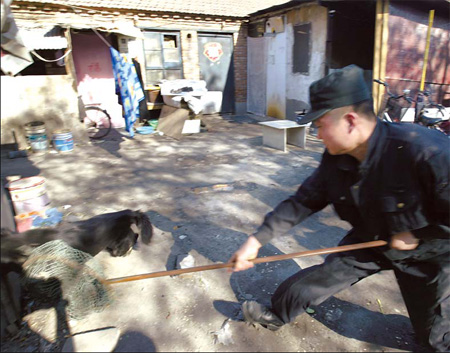Top Stories
Demolitions unleash fears of abandoned dogs
By Meng Jing (China Daily)
Updated: 2010-05-17 08:01
 |
Large Medium Small |
|
A stray dog is cornered in Chaoyang district. It will be sent to an impoundment center. [Zhu Jialei / for China Daily] |
As many as 90 percent of the families whose homes will be demolished soon said they have no intention of bringing their dogs to their new homes, according to a study by the International Fund for Animal Welfare (IFAW).
The survey, involving three villages in the Changping and Daxing districts, was conducted between May 2009 and April 2010. About 90 percent of the 172 dog owners who responded, insisted they will have to abandon their animals because of the demolitions.
Some stated their dogs no longer will be useful because they will not need watchdogs for their new apartments. Others noted sanitation concerns and the lack of courtyards for their animals to live in.
Animal welfare organizations in Beijing are under tremendous pressure from the climbing number of abandoned animals as the capital embarks on a large-scale demolition campaign.
According to the government plan, as many as 50 villages, covering 25 sq km near the rural-urban fringes, will be rebuilt in Beijing this year. About 42,000 residents and 140,000 farmers are involved in the urbanization process.
Official statistics on the number of small animals in the demolition areas are not available.
But spokesmen for animal welfare organizations estimated that most families living in single-story houses in rural areas each own at least one watchdog and one cat to control mice.
Lu Di, chairwoman of the China Small Animal Protection Association, estimates that about 500,000 dogs will be made homeless as a result of the massive drive for demolitions in the city.
Lu, 80, said her privately run shelter in the Haidian district has been taking in 20 to 30 stray dogs per day, compared with fewer than 10 before the ramping up of demolitions.
A volunteer advocate for the welfare of small animals since 1972, Lu said the problem of abandoned pets is particularly acute now.
"Maybe demolition is a symbol of moving forward materially, but from the innocent lives abandoned by those people, you will see that the owners are moving backward spiritually," she said.
Her shelter, which now houses about 1,000 dogs, needs 70,000 to 80,000 yuan monthly in support. Lu said that she lacks the money and space to rescue more dogs.
She has called for legislation requiring that those who abandon animals be forced to take responsibility for their pets.
Yu Lixian, director of the dog control department of the Beijing municipal public security bureau, said Lu is exaggerating the number of homeless animals. Still, Yu conceded that demolitions have increased the number of abandoned pets as well as exerted extra pressure on his department.
His department will intensify a publicity and education effort in the affected areas to persuade people to take their animals with them when they move.
However, He Yong, special assistant to the Asia regional director of the IFAW, doubted the influence of such a public relations push after he witnessed what he called the indifference of some villagers to the plight of their pets.
He said that as his organization conducted the survey, he found some people would rather sell their dogs or even poison them to be rid of them.
"It is so hard to believe that coldblooded behavior," He said. "They are all getting high compensations from demolition. They can surely afford to keep their dogs."
He said most of those homeowners see dogs as tools to guard their properties instead of as friends.
Xie Xiaofa, leader of the Beijing Cool Pet New World Stray Animal Rescue Platform, said that nongovernmental organizations such as hers cannot solve the problem of homeless animals without government intervention.
The organization, devoted to the care of animals, mostly cats, was founded in 2007 with 20 regular volunteers. Xie said some people will definitely abandon their animals unless the government forces them to keep the pets.
Xie said the group rescued 50 cats and 13 dogs in a demolished area of Mentougou district last September. The group has spent 40,000 yuan so far to support the animals.
"Most of the cats and dogs still lived on the sites of their former houses," Xie said. "They all suffered from starvation and diseases when we found them."
She said most animal welfare organizations are challenged most by the expense and effort of providing shelter, food and medical care to the animals, rather than the actual rescues.
"It is so difficult for us to find them proper adopted families. We've tried television advertisements, newspapers and the Internet, but none of our dogs have had any luck," she said.
"The dogs from demolished areas are usually big and don't have pretty faces because of their breeds, so no one wants them," she added.
Xie explained that the organization can always neuter cats and return them to some communities.
Dogs, however, are easily caught and sometimes sold for meat by unscrupulous dealers.








